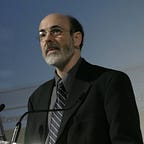Knowledge inequality
We’re hearing a great deal about income inequality in the United States during this election cycle — how the top 1% (or .01%) controls much of the nation’s wealth, while the bottom 50% or more is losing ground. There is another gap that is growing — the knowledge gap. And it is not identical with the income gap. The American knowledge gap is the gulf between a highly educated elite with specialized knowledge in their own fields and the rest of the population. Our educated elite, not necessarily wealthy, though certainly not poor, consists of scientists, social scientists, humanists, and engineers. It would be hard to estimate how many people belong to this elite. Perhaps more than 1%, but certainly not a large fraction of Americans. There are about 750,000 lawyers; about a million doctors; less than 2 million faculty in higher education. Add those in industrial research, communications, and engineering. Even if the educational elite is as many 10 million, that would only amount to three percent of the population.
The gulf between elite knowledge workers and the rest of the population is reflected in a gulf between elite universities and the rest of our educational institutions. America’s top academic and research institutions continue to be among the very best in the world. For example, in the Academic Ranking of World Universities for 2015, United States institutions accounted for 16 of the top 20. On the other hand, America’s primary and secondary schools are mediocre at best. In the OCED’s PISA 2012 rankings of 15-year olds, the United States came in 36th in math and 24th in reading.
It is certainly true that economy inequality leads to inequality of educational opportunity both directly and indirectly. It is a direct cause because American schools are funded mainly from local property taxes. Affluent people live in well-do-to neighborhoods and counties, which can therefore afford to invest in schools. Poor people live in poor areas, where low property taxes limit school budgets. Affluent parents can also afford to send their children to private schools and provide a secure home environment so that their children have a better chance to achieve. The disadvantages that poor children face are real and important and need to be addressed.
But even if these inequalities were eliminated, we would still have a knowledge gap. The fact is that many in the economic elite no longer recognize the legitimacy of our intellectual elite. Ignorance has become a badge of ideological honor. Many wealthy religious fundamentalists and their congressional representatives proudly assert their rejection of climate science or evolution. For example, multimillionaire Senator James Inhofe is the Chair of the Senate Environment and Public Works Committee is the poster boy for climage change denial. A large minority of American voters shares his ignorance. In fact, the ignorance of the American people as whole on subjects ranging from climate change to geography to history has become a subject for late night comedy. There is no particular cultural status or even economic reward for being well-educated in a general sense. As a result, each intellectual and academic community is now on its own. When challenged, it has to assert its legitimacy over and over. Evolutionary biologists cannot depend on our society’s acceptance of the legitimacy of the physical sciences (or higher learning) in general; they have to make the case for evolution again and again before an ill-informed court of public opinion. The same is true of climate science. It will now be true of any scientific or academic community whose work is seen as threatening by any substantial American community of belief.
The problem of credibility is not limited to the physical sciences. In contemporary American political culture, the expertise of political scientists, economists, other social scientists, and military experts is very often disregarded. The presumptive Republican nominee, Donald Trump, proposes blanket tariffs on China and offers mindless insults to our neighbor Mexico, not to mention the entire Muslim world. A (former) candidate, Ted Cruz, won 10 primaries with idiotic proposals such as a return to the gold standard. In the Republican primaries, such candidates won the support of millions of voters who don’t seem to realize the difference between economic and political expertise and ideological rants. Questioning authority is healthy in a well-educated society. The problem is that Americans are not well-educated enough to be able to judge when to question the authority of experts or even how to identify expertise.
There is a long tradition of anti-intellectualism in American life, but our current culture moment is feels different. What we have today is an elite and stratified system of education in a society that no longer believes in elites. In the decades immediately after the Second World War, our scientific, academic, political and economic elites in America were all relatively well aligned. The experts at MIT, Harvard, or Stanford were listened to by the politicians, and “average” citizens from America’s heartland didn’t imagine that they knew better. Now, I’m not suggesting that we should or could go back to that time. The intellectuals, the politicians and industrialists of the 1950s and 1960s made terrible mistakes precisely because they believed that their credentials, power, and wealth entitled them to run things. This group of the “best and the brightest” brought us the Vietnam War. On the other hand, the current situation in which benighted clowns have taken control of one of the two governing political parties is not sustainable. Reenforcing the ignorance of their millions of followers, these clowns (and their counterparts on television, talk radio and the blogosphere) are making it all but impossible to address politically the important questions of our time.
We need a new formula for allowing all our citizens to participate in national conversations that require expert knowledge.
